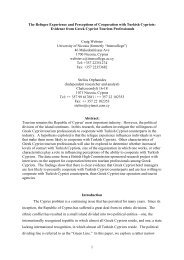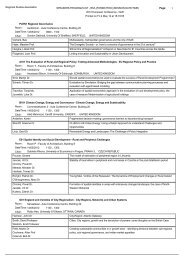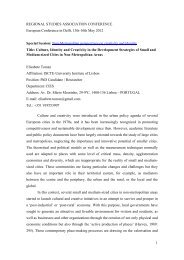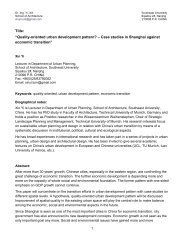Electromobility - Integrating electric charging infrastructure with the ...
Electromobility - Integrating electric charging infrastructure with the ...
Electromobility - Integrating electric charging infrastructure with the ...
You also want an ePaper? Increase the reach of your titles
YUMPU automatically turns print PDFs into web optimized ePapers that Google loves.
The MOBI.E is a pilot project and will be studied as a pilot case study. Therefore, itrequires collecting <strong>the</strong>oretical, as well as technical information. This case study presentsa research study related to electromobility (Adene, 2010), as well as <strong>the</strong> description ofan intelligent <strong>charging</strong> system, in an open platform.To obtain evidence, interviews were conducted <strong>with</strong> supervisors of <strong>the</strong> Pilot Project,which produced both quantitative and qualitative data, through <strong>the</strong> formulation of openand closed questions. A chain of evidence was attempted, but <strong>the</strong> fact that it is a pilotproject did not allow for a concrete analysis of <strong>the</strong> consequences of <strong>the</strong> project itself.3. The case studyThis case study was selected because it represents a wager on <strong>the</strong> open platformsbusiness and, thus, represents a step forward in <strong>the</strong> development of <strong>the</strong> issue ofelectromobility - <strong>charging</strong> service for EVs or PHEVs. Interoperability is a matter ofrelevant importance and MOBI.E appears to be an integrator. It constitutes a businessmodel in itself, associated <strong>with</strong> <strong>the</strong> predictable growth of electromobility. The resolutionof this integration problem requires <strong>the</strong> interaction of several entities, whose roles arenot only regulatory but also involve <strong>the</strong> development of a prototype, cash flows,<strong>electric</strong>al software, and <strong>charging</strong> solutions. Harmonising this integral framework for <strong>the</strong><strong>electric</strong> vehicle <strong>charging</strong> system is presented as <strong>the</strong> best way to attract new users to<strong>electric</strong>al mobility.As Hajer (2011) said “The frame of <strong>the</strong> energetic society encourages governments totake a different approach, and requires <strong>the</strong> various tools already available togovernments to be used in new ways”. The initiative's pilot project MOBI.E wasestablished by <strong>the</strong> Portuguese government under <strong>the</strong> “Programme for ElectricMobility”, which is integrated in a major instrument – <strong>the</strong> “National Plan for EnergyEfficiency – Portugal 2015”, approved in 2009, <strong>with</strong> <strong>the</strong> aim of expanding <strong>the</strong> use of <strong>the</strong><strong>electric</strong> vehicle in Portugal. The pilot project MOBI.E began its development in 2008,and is a smart <strong>electric</strong>al <strong>charging</strong> solution, based on an open platform.The partnership formed between various Research and Development entities, such as RENERLiving Lab, CEIIA-CE, REMOBI, <strong>the</strong> communication entity Brandia Central, <strong>the</strong> energy entityEDP INOVAÇÃO, <strong>the</strong> software technology entities Novabase and Critical, and <strong>the</strong> technology4










